
BLOG
Each day we will post a communication from one of the participants of the Syria Lebanon Partnership Network/WM trip to Lebanon and Syria, April 20-30, 2015.
Tuesday, April 21:
Six O’Clock PM Lebanon Time found me loading my suitcase into the taxi to make my way to the Beirut Airport. In the next hour I would be meeting the team of seven traveling from various places around the United States to welcome them to Lebanon!
Everyone had smooth flights and made all their connections. Everyone’s luggage arrived with them! And, everyone made it painlessly through passport control and customs. We loaded up into the taxi car and mini-van around 8pm and started up the winding mountain roads to Hamlin Guest House in Hamana. The dancing lights of Beirut’s suburbs guided us along the way.
After receiving a warm welcome from the Hamlin Staff, we took some time to overview the coming eight days together, and then everyone turned in for a hoped for good night’s rest.
Tomorrow (Wednesday) we’ll spend the day at Hamlin with pastors from the National Evangelical Synod of Syria and Lebanon. It will be a day to learn more about the Synod’s work in Syria and with Syrian Refugees in Lebanon…stay tuned for more!
From Rev. Elmarie Parker, PCUSA Regional Liaison for Iraq, Syria, and Lebanon (based in Beirut, Lebanon)
Wednesday, April 22, 2015
What a privilege to meet with several pastors and elders who serve the seventeen Presbyterian churches located in Syria. All traveled significant distances to join us on the property of Hamlin Hospital in the mountains outside Beirut, Lebanon. One ministered traveled two full days to share the stories of the congregations he serves.
While we heard statistics that are staggering about the numbers of lost and displaced Christians in Syria during the current conflict, we also heard amazing stories of resurrection and hope.
Every pastor cited incidents of violence that have affected his churches and their members. Homes of church members have been destroyed. A church operated school serving 1500 was forced to close for three months. One pastor now drives 120 miles to serve a third congregation whose pastor chose to leave Syria. Electricity is limited to 12 hours a day at best, making study and business particularly difficult. Food and money are in short supply and inflation has only made the situation worse.
Yet each pastor and elder also had good news to share in their stories of hope and renewal. The churches in Syria are coordinating many relief efforts. A significant donated sum of money provided cash, food and medical supplies for 5000 families. The school that was forced to close reopened with only 200 students. This year the enrollment reached 800. Destroyed homes are being rebuilt by churches. One congregation reported 160 children attended last year’s VBS.
With all the physical needs that face the Syrian churches and their members, each and every speaker reiterated that what they need most is our support and affirmation. Simply knowing that we care about them goes a long way toward renewing hope for the churches in this ancient country, among the first to receive and bear witness to the good news of Jesus Christ.
REFLECTION BY HEATHER MCLAUGHLIN, Parish Associate for Congregational Care, Harrisburg, PA
Thursday, April 23, 2015
Our day began with flashes of lightning and the stirrings of thunder amid a hard rain, even hail at times. We traveled into Beirut from our comfortable lodging at the Hamlin Hospital Guest House and arrived at the Synod Offices in Beirut. Worship was led with each of us taking a part in the liturgy and a meditation by Tim McCalmont from the SLPN team, whose text was from Romans 1:7-13 centering around the gift of mutual encouragement we offer to one another.
Following the worship, Pauline Coffman presented a plaque to the National Evangelical Synod of Syria and Lebanon which beautifully illustrates our partnership going forward—a heart made of fused glass in various colors representing how we are fused as one in Christ from Syria-Lebanon and the United States.
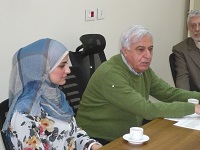
Rev. Riad Jarjour describing the peacemaking work of the Forum for Development, Culture, and Dialogue being carried out by Christian and Muslim Young Adults in Syria and Lebanon.
The first presentation was from Riad Jarjour, who introduced the work three related organizations are doing to address the crisis in Syria and the larger region. Joining him were three associates , two Christians and one Muslim telling us of ways their work was facilitating the healing of “a broken community” and the many displaced people. All three spoke clearly of specific ways reconciliation is taking place, particularly among the young people of Syria and Lebanon, both Christian and Muslim. Their Forum for Development, Culture, and Dialogue (FDCD: http://www.fdcd.org) is providing constructive ways to engage the crisis in Syria like we have never seen. The three associates all spoke of programs that helped young people “from all confessions” to collaborate and dialogue together, building relational bridges and practical, on-the-ground reconciliation and peace development projects that seem to be taking hold.
These programs are working to bring together people of the various faith communities in a dialogue to confront the influences of extremism in the area and the effects of “islamophobia.” The young people are doing this through music and art, relief work, and practical problem solving that bring together Christian and Muslim toward a common goal.
Rev. Suheil Saoud, representing the Synod’s work in Education then spoke convincingly about the strategy the synod is using in impacting the current situation through schools in various areas. Taken from the importance placed on education out of the Reformation period, he reminded us of how the work of the Presbyterian church in Syria and Lebanon first began, with the plan to build two schools for every church in a community. He illustrated how that not only grew the faith community but how it impacted the education of so many young people in Syria, regardless of their faith tradition. In fact, the majority of moderate Muslim leadership in the region, if you were to look at their educational history, you would find that most of them have attended a Christian School or University. To this day there are 7 schools in Lebanon and 1 in Syria run by the Synod and another four schools in Syria run by individual congregations. The Synod hopes, with the help of partners from the USA and Europe to open two more schools to accommodate low-income/no-income Syrian students currently displaced to Lebanon—a need for the foreseeable future. These schools have survived the recent crisis and stand as a beacon in their respective neighborhoods. He highlighted the schools in Homs, Aleppo and Tripoli as examples. Prior to the war, the church-run school in Homs had an attendance of 1,600 students, 53% of whom were Muslim. This school, which stayed open with exception of three months, during all of the awful fighting that took place in Homs, currently has an enrollment of 800 students. The feeling among many is the churches will not continue without complimentary schools.
Rev. Suheil closed speaking of how the schools are getting along with the state requirements by teaching Bible values in place of the Bible itself. The plan avoids pure proselytizing but teaches Biblical values to create a model for community in a safe environment.
Najla Kassab, shared the critical importance of the four-pronged approach of the moral, spiritual, social and material goals of their ministry. All are important to emphasize for the church’s work in the Middle East. She raised the question of what the impact in the region will be if the church carrying out this multi-pronged work disappears from the face of the middle east. We must be the voices who speak out for this priority at this time.
The day ended with discussions of how the interactions in Syria/Lebanon and the actions of the PCUSA influences the ministry here. We reiterated the need to keep our focus on areas of common interest and on the centrality of Christ and the gospel going forward.
Quite a full day, with more to come. Stay tuned….
REFLECTION BY TIM MCCALMONT, Pastor, Costa Mesa, CA
Friday, April 24, 2015
O God, you called each of us to come to Lebanon to learn about the witness of your Church in the Middle East. On a clear, blue-sky spring day you invited us to the beautiful Bekaa Valley to meet, talk with, and listen to some of your 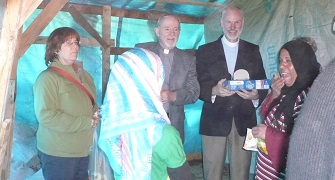 people in the Zahle refugee camp. We saw the conditions there, where about 7,000 refugees from Syria live, 10 or 12 in each plastic-covered hut, with no health care, no education for the children, no work for the men, very little money to carry them through each month, and no hopes of returning to their homeland. We walked into this valley of despair and felt your people’s pain – a people in exile. We felt their pain, we took some of it with us, and we carry it still.
people in the Zahle refugee camp. We saw the conditions there, where about 7,000 refugees from Syria live, 10 or 12 in each plastic-covered hut, with no health care, no education for the children, no work for the men, very little money to carry them through each month, and no hopes of returning to their homeland. We walked into this valley of despair and felt your people’s pain – a people in exile. We felt their pain, we took some of it with us, and we carry it still.
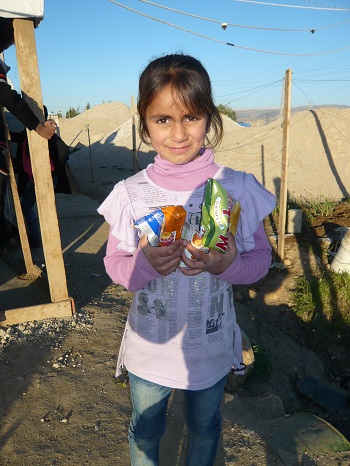
A young girl from the Zahle Refugee Camp with gifts for the moment, but many long-term needs like education, health care, and a life-giving future.
Yet you do not leave us in this dark place. For you are a loving God, full of compassion and mercy. You will bring your people out to a wide, spacious place – a place of hope and love and care, where all are fed and housed and cared for. Truly God is listening.
REFLECTION BY SUSAN SCHROEDER, Ruling Elder, Eugene, OR
Saturday, April 25
We have looked forward to this day for months! Our visas to cross the border from Lebanon into Syria were approved Friday afternoon, even though the Consulate was closed Friday. How does this happen? Ask Asis (Rev.) Fadi Dagher, General Secretary of the National Evangelical Synod of Syria and Lebanon (NESSL). He can work miracles!
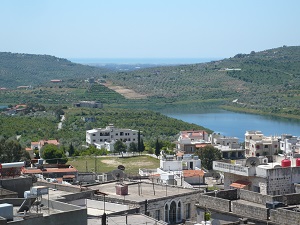
Looking from Yazdieh toward the Mediterranean Sea
Upon reaching the border, we found Asis (Rev.) Michel Boughos, pastor of the Evangelical Church of Yazdieh, who would help us negotiate the crossing and get us to Yazdieh. He has been pastor of that church for 34 years now. But the mission of Asis Michel and his wife Huda has intensified since the Syrian fighting began in 2011. Families fleeing from the East began arriving, and Huda organized the response, with food baskets, help finding housing, and even offering the basement of their home to another family.
They took us to Salfit and Majdal Helou in the afternoon to meet some of the families. We crowded into living room after living room to listen and to ask questions of men, women, children, and some older parents. The stories of flight from Raqqa (North-Central Syria) to Hasaky North-East Syria) and then again to Majdal Helou (South-West Syria) told us of violent actions by militias and foreign flghters who warned Christians to either convert to Islam, pay a Jizza (fee to live as a minority), or leave. The stories were overwhelming, especially as the emotions intensified.
In the midst of it all, a rooster would crow somewhere on the hillside, and remind me of the daily life that goes on in the midst of such sadness and despair. I listened as some members of our group asked detailed questions and others simply listened. I tend to listen, and was surprised when the questions brought answers I didn’t expect! We are helping each other by our different learning styles.
Some of these families have been where they are now for two years or more, others just arrived. All of them must deal with loss, despair, uncertainty for their future, and difficulty finding work. One commented that he knew his parents would have the despair for the rest of their lives. They are managing because of the generosity of the church family in Yazdieh.
One more word: we feared we would not be safe in Syria even though we were assured we would. Everywhere we went, we have been escorted by church members. Though we have seen lots of damaged and destroyed buildings (more on this in Sunday’s reflections), we have also seen undamaged buildings and homes, and the beautiful spring green hills and mountains of Syria and have not felt unsafe even once. We pray to God to be with all those who suffer and bring an end to this terrible period for Syria, especially the Christians.
REFLECTION BY PAULINE COFFMAN, Syria-Lebanon Partnership Network Convener & Ruling Elder, Chicago, IL
Sunday, April 26, 2015
There have been few times in my life when I have been so overwhelmed as these past several days here in Lebanon and Syria. Yesterday as we traveled the dangerous roads from Lebanon into Syria and as we spoke with so many who have been so impacted by this crisis, I don't have words that can describe the burden of loss and pure sadness at what has happened in this beautiful land. As one said to me looking me dead in the eye, our soul has been ripped out of us. Something wicked this way has come and it has raked over this beautiful land and these precious people, and it stands as something that could divide and destroy us all.
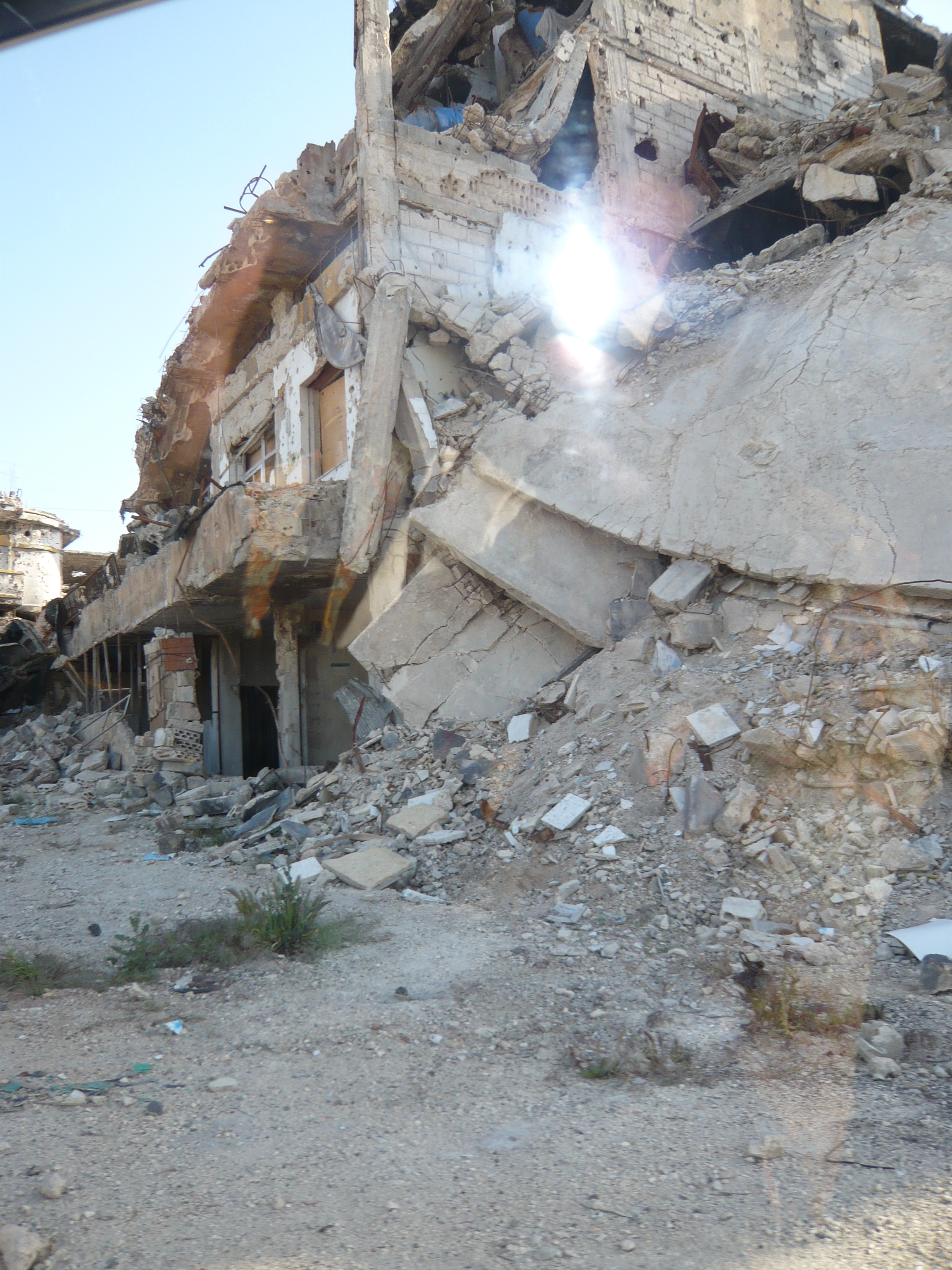
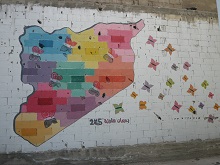
The commitment to see renewed life come to Old Homs and Syria expressed through the artwork of both adults and children is painted on walls still standing after the fighting ended here now nearly a year ago.
In the midst of such devastation and despair I have sensed a resilience that will not die. There lives here in these people a sign of hope that stands above the smoke and ruins around them and that sings sharper and louder than the noise of chaos still heard from distant gunshots and mortar fire. The people of the Evangelical Presbyterian Church of of Homs and partner churches live in hope and anticipation of what God is about to do and their worship and warm fellowship glows with this faith. We on the team were asked to lead in worship on Sunday and I was invited by Pastor Mofed Quarajilly to deliver the sermon, something I have done each Sunday for more than 22 years in my own church in California. But this Sunday was different. I was honored and humbled to stand before these 150 smiling, gracious people to proclaim the one true hope we all can share and to see in their faces and hear in their voices that same hope that leads us forward.
What we sang together in two different languages, was brought together by the Holy Spirit and made the language of God’s redemptive kingdom. And this became a light that shone in the faces of senior adults and in the smiles of the young children of the school, singing songs to us as we strode through their classrooms. Homs and partner churches live in hope and anticipation of what God is about to do and their worship and warm fellowship glows with this faith. We on the team were asked to lead in worship on Sunday and I was invited by Pastor Mofed Quarajilly to deliver the sermon, something I have done each Sunday for more than 22 years in my own church in California. But this Sunday was different. I was honored and humbled to stand before these 150 smiling, gracious people to proclaim the one true hope we all can share and to see in their faces and hear in their voices that same hope that leads us forward.
In our worship we heard about partnerships, about prayer for one another and about the joy of a sharing of God’s Spirit that brings a mutual blessing of peace and unity between us all. Today, we saw Jesus among us and especially in the faces of our new Syrian friends.
There is something of God here that has become more real for me than ever before. Even in the midst of such travail, such devastation, or perhaps I could say especially among such travail and devastation, we find who God is and what God is truly about. Today I was in His presence, in the unity of God’s Spirit and the wonder of God’s peace. Praise be to God!
REFLECTION BY TIM MCCALMONT, Pastor, Costa Mesa, CA
Monday, April 27
After several days listening to stories of displaced Christians in Syria and church leaders talking about the political options they think will support their life and ministry in and to the communities in which they serve, we returned to Beirut, Lebanon for an abrupt change in direction. Visiting with scholars at the Lebanon American University, an institution developed by Presbyterian mission efforts, we listened to academics talk about their analysis of the Syrian Crisis and the future of Syria.
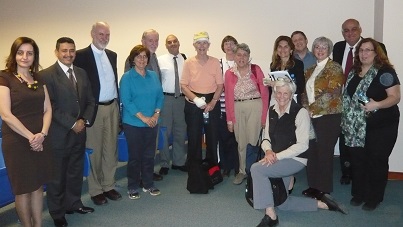
The team with LAU Faculty Panelists.
Two presentations continue to hold my attention – one on the economics of the crisis and the other on arts, culture, and communications as a tool to create a future. These two presentations span the spectrum of emotions I have felt during this trip. From the tragic economics of war, refugees, crumbling infrastructures, and the heartbreaking impacts of joblessness and insecurity, one is left wondering from where hope can be mined. On the other hand, a presentation on the use of arts and communication (theater, art, social media, etc.) shared how the hope of the human spirit is being used to educate, speak truth, and inspire optimism for the future.
That leaves me with a choice to despair or to hold on to hope. Through human history we have lived through what appears to be hopeless circumstances, yet, the God we trust is always working with the seeds of hope to restore and recreate life. I trust that the churches of the National Evangelical Synod of Syria-Lebanon will continue to nurture those seeds of hope and find ways to help people imagine, through faith, a new and abundant life. As I return to the United States, I plan to hold on to hope. I plan to pray and support the churches of our sister denomination as they meet both the humanitarian needs of those displaced and nurture hope in the hearts of their neighbors.
REFLECTION BY LORNE BOSTWICK, Pastor, Eugene, OR
Tuesday, April 28, 2015
Tuesday found us meeting with many different partners—demonstrating the breadth of the Church’s work in Lebanon and the larger region.
Interfaith Forum at the Near East School of Theology
The Near East School of Theology (NEST) was founded by Presbyterians in the 18th century. It has served not only Middle East students from Palestine, Jordan, Syria, Armenia, and Egypt but also countries in Africa. Often European students spend a year studying at NEST (it’d be great to see Americans participate as well). The goal of NEST is to be a stimulus to keep Christianity alive in the Middle East. Because of the conflicts in the Middle East, the number of students studying for ministry is down to around 25. Many of the students are women. No woman has yet been ordained, but that ordination is probably on the horizon. At this time much NEST energy is being put into Muslim-Christian dialogue.
We met with NEST president George Sabra and a Muslim and Christian of another tradition for a forum on Interfaith Dialogue. The three panelists had grown up together and played with each other while in elementary school. Their interaction was a delight to watch.
The panelists noted four aspects to healthy dialogue:
- Existential dialogue: that every day living together that creates relationships, history and trust. The panelists had grown up together and have achieved this well. The depth of relationship could be felt in their conversation.
- Political dialogue: in the Middle East with current conflicts and deep divisions, this can be very difficult because it often is politicized, but political dialogue is extremely important, even if the only consensus is to disagree. Trust from existential dialogue is crucial to developing healthy political dialogue, remembering that friendship is not cloning.
- Social dialogue: Often Christian are scared of Muslims and other minorities. This fear has to be overcome through conversation and trust.
- Theological dialogue including looking at doctrines of each faith: This comes slowly as other areas are worked through.
We in the United States need to look at the four steps to fruitful dialogue rather than starting with theological issues that divide us and are hard to deal with unless there is deep trust.
Some of the valuable insights received by the group from the panel include:
- The need to energize moderate Islam
- The questioning of whether Saudis are moderate
- The need for the United States to help people help themselves
- The reality that some Middle Easterners are not interested in the Israeli-Palestine conflict. If Israel did not exist, there would still be deep conflicts in the Middle East. Nationalism and socialism create problems as do military regimes.
- Lebanon still feels the results of years of Syrian occupation. This can create tension and conflict.
- Questioning the wisdom of Syrian Christians blindly supporting Assad. Perhaps some of their support is a result of fear of the Assad regime. There are even spies in church youth groups and spies who monitor sermons. This prevents Christians from saying what they really think. But anything looks good against ISIS.
- The number of refugees (1.5 million from Syria in a country of 4 million) is overwhelming Lebanon.
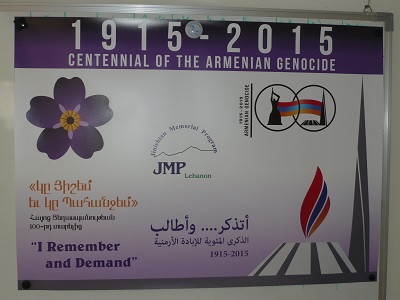 Jinishian Memorial Program: The meeting with the Jinishian Memorial Program, a Presbyterian Armenian group established in 1966, explored ways they are doing needed social work among refugees. Their work includes work with teens and mothers, financial workshops, medical and pharmaceutical services, and social and community development. As well as work in Lebanon, Jinishian has three offices in Syria. It was especially meaningful to hear of this work after our team had joined the Armenian Evangelical Churches for a joint service on Friday to remember those who lost their lives in the Armenian Genocide of 1915.
Jinishian Memorial Program: The meeting with the Jinishian Memorial Program, a Presbyterian Armenian group established in 1966, explored ways they are doing needed social work among refugees. Their work includes work with teens and mothers, financial workshops, medical and pharmaceutical services, and social and community development. As well as work in Lebanon, Jinishian has three offices in Syria. It was especially meaningful to hear of this work after our team had joined the Armenian Evangelical Churches for a joint service on Friday to remember those who lost their lives in the Armenian Genocide of 1915.
Signs commemorating the 100 Year Remembrance of the Armenian Genocide blanket the Armenian community in Beirut.
Middle East Council of Churches (reflection by Rev. Elmarie Parker): With roots that go back to 1910, the MECC took on it’s current form in 1974 to provide a place for shared conversation, work, and witness for Protestants, Oriental/Eastern Orthodox, Orthodox, and Catholics, along with facilitating Christian-Muslim Dialogue. The MECC is active now not only in the Levant and Mesopotamia areas of the Middle East, but as of 2014, also in the Gulf!
The MECC's diaconal and justice work among migrants, refugees, and stateless peoples is especially impressive. Our Lady Dispensary in Beirut serves 500 displaced Iraqi families on a regular basis providing food coupons and primary medical care. They cooperate with a network of specialists for medical issues requiring further attention. A women’s livelihood program has recently been developed that focuses on economic empowerment, rights, and elderly adult support. Over the past 10 plus years, they have also given special attention to issues of human trafficking in the region and human rights development in Lebanon. Funding for this has dried up as western funders have turned their attention to livelihood issues. This raises the issue of the need in the west (both Europe and the USA) to find ways to better listen to our partners as they seek to invest in deep, systemic change in their country and region…change that is essential, but takes time to develop, and requires a long-term, multi-decade commitment. To see MECC no longer having funds for the work of cultivating human rights for the most vulnerable and for addressing the issue of human trafficking in the region brings me great grief.
Meeting with the Faculty from Lebanese American Univesity: On Monday afternoon the group also met with faculty from American University Beirut who explored issues such as:
- the results of the huge influx of Syrian refugees, especially since Lebanon did not give power to the UN to develop camps as did N. Iraq, Jordan and Turkey
- the impact of media as myth makers
- the impact on the economy


